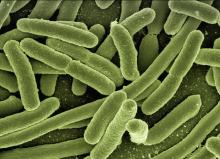Bacteriology
Staph found in school meals linked to mass food poisoning
Strains of the staphylococcus bacteria have been detected in samples of school lunches that allegedly caused mass food poisoning among dozens of primary schoolchildren in the city of Lamia last week.
According to state broadcaster ERT, staph was identified in ten food samples sent to the regional National Public Health Organization laboratory in Thessaly.
Game-Changer: Swift Bacteria Identification Method to Cut Antibiotic Use
Amid growing concerns over antibiotic resistance, a groundbreaking development has emerged, offering hope in the fight against bacterial infections. Researchers have unveiled an innovative method for swift bacteria identification, potentially reducing our reliance on antibiotics.
I’m a gut doctor. Here are 4 signs your poop habits are unhealthy
The gut microbiome – the community of bacteria and other helpful organisms in your gut – can affect “every aspect of your health”
Feces in the Sea: Up to 41 times above the norm is the Pollution on the Bulgarian Black Sea Coast
Pollution of the sea water up to 41 times above the norm found a joint inspection of scientists from Sofia University and the Association "Active Users" on the beaches along the Southern Black Sea coast.
Its results and analysis were published today.
Bulgarian Scientists with a New Method for the Purity of Beer
An innovative method for the study and control of microorganisms in beer has been developed by Bulgarian scientists from the Center for Food Biology (CBH) with the assistance of the Union of Brewers (SPB). The molecular biological method for the microbiological purity of beer has no analogue in Europe and is based on the popular real-time polymerase chain reaction - qPCR.
Scientists successfully “wake” microbes that had remained dormant for 100 Million years
The microbes belong to ten different groups of bacteria that entered an energy-saving state when the dinosaurs roamed the Earth
Slovenian research sheds new light on microbiome
Ljubljana – A group of Slovenian researchers has created software that helps scientists analyse the content of microbiomes, the communities of microorganisms living in the human gut, in order to detect specific pathways that may indicate the presence of a disease. The discovery creates opportunities for the development of new personalised-medicine therapies.
- Read more about Slovenian research sheds new light on microbiome
- Log in to post comments
How to Stay Calm While Studying for Exams
It's no secret that exams can be stressful. The reality is that we're all bound to experience some anxiety when preparing for tests. However, there is a limit, and studying shouldn't be a nerve-racking experience. Too much stress can have a negative impact in vital areas such as memory and concentration.
- Read more about How to Stay Calm While Studying for Exams
- Log in to post comments
Bulgarian Food Safety Agency Bans Imported Fodder Containing Genetically Modified Bacteria
The EC undertook measures aimed at curbing the spread of unauthorized genetically modified bacteria in Vitamin B2 (riboflavin) in fodder, reported the Bulgarian National Radio.
Following an inspection the Bulgarian Food Safety Agency banned an imported fodder containing unauthorized form of Vitamin B2.
Scientists Create Electricity Through Mushrooms and Bacteria
A regular shop-bought mushroom has been turned into an electricity generator in a process scientists hope will one day be used to power devices, writes the Independent.
The "bionic mushroom" was covered with bacteria capable of producing electricity and strands of graphene that collected the current.








